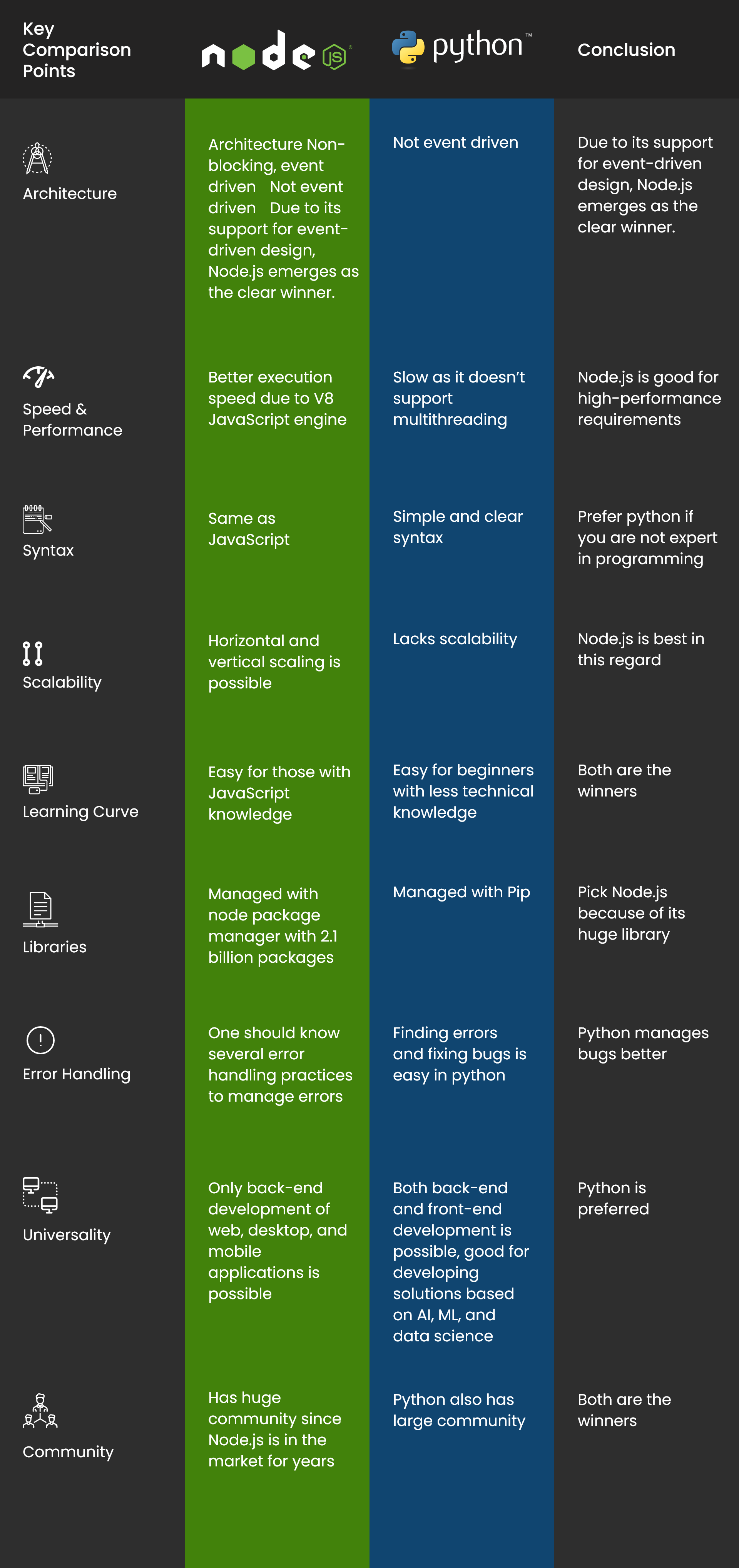The ever-changing dynamics of software development necessitates thoughtful selection of the technologies to be used in a particular development project considering the long-term roadmap of the company and/or product. Two most popular technologies are Node.js and Python and picking one can be challenging. Comparing Node.js and Python is a trending topic nowadays. Statista reports that Python is used by 48.24% of developers whereas Node.js is used by 47.12% of developers.
Thus, deciding which one to choose is quite difficult if we go by popularity. However, there are a few criteria that helps you reach the conclusion.
In this blog, we will present you with an in-depth comparison of Node.js vs Python, so that you may get rid of the dilemma and choose the best technology for your business.
Node.js and Python: Overview
The Node.js platform is built on V8 JavaScript Engine of Google and is intended for use on servers. It paves the way for the creation of real-time online applications that rely heavily on data. Based on JavaScript, Node.js enables cross-platform software deployment across OS like Windows, Linux, and Mac OS.
Though python is a popular choice for developing interactive web apps because of its object-oriented nature, today the language is used mainly in the field of AI, machine learning, and data analytics. Python’s simplicity and dynamic semantics make it a great language for scripting. Since its inception in 1991, Python has been used by programmers everywhere. It was designed to give excellent readability, flexibility, and rapid development.
Node.js Pros and Cons
Here are Node.js pros and cons –
Pros
Diverse Technological Stack
Since JavaScript is the foundation for Node.js, all the tools, libraries, and user base that support JavaScript are available to you as well. The MEAN technical stack, which includes Node.js, provides the finest database support as well as front-end and back-end support for modular development.
Adaptable to Microservice Design Needs
Node.js developers can easily modify number of modules simultaneously thanks to its default package manager. It has several free components to help you develop a microservice architecture without losing the product quality and interrupting the testing process.
High Performance
One can achieve high performance with Node.js as code compilation and implementation is fast and easy because of Google’s V8 JavaScript engine. The runtime environment also supports the operation of non blocking I/O requests boosting the speed of code execution.
Cons
Unstable API
With Node.js, back-end becomes incompatible because of the frequent API switches that are very common with the framework. As a result, any changes made in the code are badly affected making the entire code unstable.
Callback Issues
Due to its asynchronous nature, Node.js has the issue of nested callback functions resulting in callback hell. In case there are multiple callbacks, the quality of the code gets reduced, and the problems become more difficult to fix and keep up with.
Incapability To Perform CPU-Bound Task
Node.js has trouble completing CPU-bound activities because it only supports a single thread at a time. The system will only ever accept one of two requests at a time, and it will always fulfill the first one. As a result, there will be a significant delay in the process.
Python Pros and Cons
Pros
Quick Development
Python’s easy-to-understand syntax and swift interpretability make it a popular choice for those who want to reduce the time spent on coding. The reduced amount of code needed for development means less time spent writing codes and more time spent optimizing for speed.
Flexibility
Python’s openness and compatibility with various programming languages and environments make it a versatile choice. When developing a product, developers no longer have to start from scratch every time they need to use a different language, tool, or platform.
Massive Library
Python’s extensive library support makes it ideal for building any kind of application, from games to websites to machine learning and beyond. It acquires convenient libraries for programming, and the code from such libraries can be reused in other projects.
Cons
Incompatible With Mobile Application Development
Python’s lack of popularity as a native app development language makes it incompatible with mobile app creation. In addition, neither Apple nor Google’s OS platform facilitates Python-based mobile development.
The Sluggish Pace of Execution
Python’s execution of code is carried out one line at a time, which makes the execution of web applications slow.
Memory Exhaustion
Maintaining a web app’s speed and effectiveness necessitates less memory depletion than ever before. Python’s memory usage is excessive, resulting in worse performance of apps.
Difference Between Python and Node.js: A Detailed Comparison

1. Architecture
Node.js
Node.js is an asynchronous server-side programming framework. As a consequence, this ensures that the input-output capability is never stalled by a running operation. Node.js uses a single-threaded event loop as its underlying architecture. The combination of this loop and non-blocking nature of Node.js allows handling of hundreds of simultaneous connections without requiring frequent thread context switches. This is why Node.js is ideal for use in mission-critical systems.
Python
When compared to Node.js, Python’s architecture is very different. Perhaps, it’s because asynchronous programming isn’t a core feature of Python. Not only that, but it also don’t even support multithreading However, asynchronous event-driven programs can be built with the help of libraries like asyncio.
Conclusion: Due to its support for event-driven design, Node.js emerges as the clear winner.
2. Speed & Performance
Node.js
As we’ve seen, its execution is speed up and simplified by its non-blocking architecture, Node.js allows you to run code in environments other than a web browser. As a result, browser-based apps can operate at a higher level across all efficiency parameters. Additionally, this allows the application to make advantage of components like TCP sockets that browsers normally don’t support.
Python
Multithreading is severely hindered by Python’s design, which negatively impacts both speed and performance. Though python’s syntax is simple to pick up and use, the language’s execution speed prevents applications from quickly retrieving information stored on a web server.
Conclusion: Node.js is the way to go if you need lightning-fast performance.
3. Syntax
Node.js
Syntax is distinct from the other evaluation criteria we’ve talked about. This is due to the fact that everyone has different preferences. The syntax of Node.js, has similarity with the browser’s JavaScript. So, if you’re already comfortable with JavaScript, then Node.js won’t be that difficult for you.
Python
Python’s syntax is often regarded as one of its greatest strengths. Because writing code in it requires less words than in Node.js and also there are no curly brackets to be used. This saves huge time of the programmers. Both bug fixing and reading the code are also simplified that even a client with less technical familiarity can understand the code.
Conclusion: Python wins this round thanks to its clear syntax.
4. Scalability
Node.js
With Node.js, you can build a collection of independent services rather than one massive monolithic one. These microservices allow independent operation and communication through a lightweight mechanism. The Node.js development process is very adaptable, allowing for the addition of new modules and microservices with little effort.
The Node.js web application can also be scaled both horizontally and vertically. Adding extra nodes to the system is what’s needed for horizontal scalability. The same holds true for vertical scaling; more resources must be added to the existing nodes. Node.js also provides more flexibility in terms of typescript, allowing you to choose between the strongly typed TypeScript and the weakly typed JavaScript.
Python
Python lacks capabilities for multithreading, a feature crucial to the app’s scalability. This is mainly due to the incorporation of Global Interpreter Lock (GIL). GIL prevents the Python interpreter from running multiple threads at once, even if there are many threads available.
Due to the incompatibility between threads and Python’s memory management, the language is forced to make use of GIL despite the performance hit it takes. Similar to Java, Python supports dynamic typing. When it comes to the scaling of a project, statically typed languages do better than their dynamic counterparts which adds complexity to the system.
Conclusion: Scalability is not possible in Python compared to Node.js.
5. Learning Curve
Node.js
Node.js’s JavaScript heritage makes it an approachable language. If you know the basics of JavaScript, you won’t have much trouble. Because of its low barrier to entry, Node.js scored an incredible 51.4% in a developer survey, making it the most widely used framework. Installing Node.js itself is a breeze. However, there are several complex elements included.
Example: Its event-driven architecture may be confusing at first. It will take developers some time to learn and use it effectively. Improved app performance is one of the most recognizable benefits of event-driven development.
Python
If you are not already familiar with JavaScript and must pick up between learning Node.js and Python, you should focus on the latter. Learning Python is less challenging than learning other languages because of its straightforward syntax.
Another advantage of Python over Node.js is that it only needs a smaller number of lines of code to create a given function. Code length is a function of both programming paradigm and programming style, thus this is not always the case.
Python’s sensitivity to whitespace and indentation can be used to teach you how to format your code correctly. There is, however, a downside to this. Simply put, your code can be readily compromised by something as simple as a missing bracket or incorrect indentation. As a result, it may be more challenging for the inexperienced developers to determine the cause of the problem and fix it.
Conclusion: Because of their similar ease of learning, it’s hard to pick a winner. Thus, the answer is highly subjective.
6. Libraries
Node.js
The Node.js packages are managed using npm (Node Package Manager). Over 2.1 million packages are maintained by Node Package Manager, making it the largest repository of its kind. It also demonstrates its potential for growth. All the packages are easily searchable on npm.
Python
Python’s standard library and package manager is called “pip,” and it is responsible for installing and managing Python’s libraries and packages. In comparison, Python boasts over 220,000 packages for use in areas as varied as image processing, computation, data science, etc.
Conclusion: Simply put, Node.js’s wider package set makes it the superior choice.
7. Error Handling
Node.js
When coding, it’s obvious to make mistakes. For this reason, a programming tool’s mistake detection capabilities and clarity are crucial. Regarding effective error management, Node.js excels. When errors arise during the execution of code, it is quite good at finding them.
Python
Python’s error handling is superior to that of Node.js. In comparison to Node.js, it takes significantly less time to identify and fix faults and other issues. Regardless of whether you use Python or Node.js for your web development, error handling will not hurt.
Conclusion: Python is significantly better at managing mistakes as compared to Node.js.
8. Universality
Node.js
As most cases, Node.js is employed in the backend of a web application. Moreover, JavaScript is used for front-end development, so the same language is used for both the server and the client sides. Node.js can be utilized in the creation of web applications, Internet of Things (IoT) solutions, and hybrid mobile applications.
With Node.js, you can write just one program that runs equally well on Mac, Linux, and Windows because it supports cross-platform operation. This flexibility of Node.js allows development team to handle all aspects of a project and drastically cutting down on expenses.
Python
Since it is a full-stack language, Python may also be used for creating user interfaces and back-end systems. In addition, Python is cross-platform same as Node.js. It means that software designed for Windows can be deployed to other platforms like Mac and Linux. It comes pre-installed on these two OS. However, the Python interpreter must be downloaded and installed on Windows.
Talking about its usability for mobile and web app development, Python is not good for mobile app development. Though, it is widely popular in developing IoT, data analytics, AI and machine learning solutions because of its flexibility and simplicity.
It also has good frameworks and huge collection of libraries to implement these solutions effectively
Conclusion: Python and Node.js are equally universal programming languages.
9. Community
Node.js
This programming language is in the industry for more than a decade and within that time it has become popular among the developers. Thus, business owner looking to hire talented Node.js developers won’t have a hard time at all.
Python
Since Python has been around for longer than Node.js, it naturally has more dedicated users. Junior and high level professionals alike have contributed to it. In regards to Python, there is no lack of skilled individuals. As a result, it is far less of a hassle for firms to recruit and hire Python programmers. In addition, the overall development of Python benefits from the engagement of its developers.
Conclusion: As far as community support goes, Node.js and Python are on the same page.
Real-World Use Cases of Node.js and Python
Node.js
There are so many real-world examples of applications that use Node.js. LinkedIn is one of them. The popular business networking system moved to Node.js from its ROR because of few reasons. Scalability and performance efficiency are the two obvious advantages of Node.js due to which company built its entire mobile software stack on it.
Moreover, it made the app faster, reduced the number of servers required from 30 to 3, and lowered the memory expense.
Other popular apps built on Node.js from different sectors are PayPal, Walmart, Uber, Netflix, Trello, and more. Node.js’ ability to deal with extensive data, handling multiple requests from server-side proxies, pushing data in real-time, and quick exchange of messages are few of the reasons that made these apps efficient.
You can even develop games for browsers using node.js along with Socket.IO and HTML5. Best part is third-party plugins are not required for managing the players.
Node.js is ideally suited for applications that require a stable connection between the client browser and the server because of its execution environment. If a chatbot, for instance, can’t communicate with its host server, it won’t be able to do its job. No matter how fast it can recover, it can’t effectively handle client inquiries under those conditions. Therefore, Node.js is the way to go if instantaneous data transfer is crucial to your project.
It’s also worth noting that Node.js can be utilized in both client and server environments. This greatly shortens the deployment window and facilitates code maintenance and collaboration across teams. Due to its speed, Node.js is a popular choice among businesses that rely heavily on communication between their client-side applications and cloud servers.
Python
Python’s simple syntax is largely responsible for the language’s impressive skill set. Because of this, Python is widely used by tech behemoths like Facebook and Google. It has gain popularity mainly in the field of AI, machine learning, and data science nowadays.
Almost every industry from travel, fintech, transportation to healthcare is using python for it. Michelangelo PyML, Uber’s machine learning platform uses python to solve challenging problems faced by the company such as fraud detection.
Many well-known data science courses are taught exclusively in Python. Furthermore, Python’s popularity pushes its utilization and consequently more individuals try to learn it. As an added bonus, MVP’s extensive library can be used to speed up the development and deployment processes.
Conclusion: Both the technologies have numerous uses. This means you have the flexibility to pick the appropriate option as per your business needs.
Conclusion: Which One to Choose?
Both Node.js and Python are excellent programming languages with many advantages; deciding between them is therefore challenging. But, its easy to pick one depending upon your requirements.
The difference between python and js – Node.js is a great choice for solutions that require instantaneous data processing, such as those involving real-time applications, heavy-load applications, e-commerce implementations, content management software, and similar solutions.
In a similar vein, Python is the language of choice when developing solutions based on machine learning, AI, data science, where image recognition, advanced computing, and data analytics is required.







